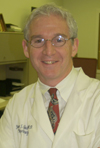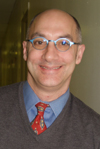Neurosciences dept. builds 1st class
team
by Mary Helen
YarboroughPublic Relations
Despite its relative programmatic youth, the three-year-old Department of Neurosciences already is on course to becoming nationally recognized for its span and depth of neurological and neurosurgical services and expertise.
Established from a combination of two clinical departments and one basic science department, the Neurosciences Department exemplifies the vast possibilities through synergy. The department now offers unique and expert therapies in stroke, epilepsy and cerebrovascular surgeries; spine, neuro-oncology, stereotactic and functional neurosurgery; movement disorders; and pediatric neurosciences.
Part of building this extraordinary program is the ability to recruit some of the nation’s best neurological clinicians and researchers. As evidenced by a flurry of new recruits, this part of the mission is being realized, notably by the arrival of two who specialize in pediatric neurological diseases, including spina bifida, cerebral palsy, and epilepsy.
 Dr. Steven Glazier
Dr. Steven GlazierAmong a team of top-rated neurological experts that have joined MUSC within the past several months is neurosurgeon Steven Glazier, M.D., who helped develop a breakthrough treatment for cranio-synostosis (in which the bones of a child’s skull fuse too early) while at Wake Forest University School of Medicine. Glazier now is MUSC’s chief of neurosurgery, director of pediatric neurosurgery, and the surgical director of MUSC’s comprehensive Epilepsy Center.
“My interest is in the whole of pediatric neurosurgery, from craniofacial surgery to the treatment of spinal anomalies,” Glazier said. He was inspired by his younger brother, who is developmentally disabled, to become a neurosurgeon. “I wanted to grow up to fix his brain. That’s how I ended up being a neurosurgeon.”
A philosophy major at Colgate University, he was driven to do more than think about things. “I wanted to do something about it,” he said. As a result, he has performed surgical solutions to life-altering epilepsy, spina bifida, and has performed brain revascularization, a type of vascular bypass to help re-establish blood flow to areas of the brain impaired by radiation or idopathic disorders such as Moya Moya disease.
Glazier, who received his medical degree from Georgetown University, adds to the department’s previous hire, Jonathan Edwards, M.D., who received his medical degree from Wake Forest and came to MUSC from the University of Michigan Medical School. Edwards is a noted epileptologist, and is the director of the department’s Epilepsy Center.
“These two physicians will lead our efforts to bringing to South Carolina an epilepsy program that will be world class,” said neurosurgeon Sunil Patel, M.D., clinical chair of the Department of Neurosciences.
A second star recruit is Stephen Kinsman, M.D., a child neurologist who directed the Spina Bifida and Related Conditions Center at the Kennedy Krieger Institute and was then chief of pediatric neurology at the University of Maryland, Baltimore for the last few years. Kinsman, who earned his medical degree from the State University of New York, is the new division chief of pediatric neurology at MUSC.
 Dr. Stephen Kinsman
Dr. Stephen Kinsman“We do all facets of child neurology,” said Kinsman, who spent several years honing his pediatric neurology skills at Johns Hopkins. “We will cover the entire Lowcountry in extending therapies and treatments for complicated neurological disease and disorders of children and adolescents.”
Dynamic and effervescent, Kinsman sees his role as that of an inspirational leader and a team builder, seeking out those who contribute to the program “in ways in which the sum is greater than the parts.”
Additionally, Kinsman said the division is committed to blending research into clinical applications.
“We plan to bring full collaboration between the researchers and the clinicians, taking advantage of the research strengths of MUSC faculty, and striving to apply bench research to the bedside. We want to focus on rapidly evolving imaging technology to better understand disorders of cognition and development and devising more effective treatments,” Kinsman said.
Meanwhile, Glazier and Kinsman are working out plans to integrate the surgical and medical disciplines into an advanced pediatric neurosciences program as they bring more integrated infrastructure and research to their often shared patients.
Unique in many ways
In addition to bolstering its pediatric neuroscience services, the department also recently added Robert Adams, M.D., a nationally recognized expert in stroke recruited from the Medical College of Georgia. Adams has helped MUSC become a stroke center, which is a critical and unique designation in South Carolina.
“MUSC is the only hospital in the state with a dedicated neuro-critical care unit with neuro-intensivists,” Patel said. “The level of stroke care at this hospital has taken major leaps forward. With the development of telemedicine, we hope to bring this level of care to patients in the entire Lowcountry and surrounding counties.”
The department now has a full spectrum of specialists who collaboratively manage spine problems that include six neurosurgeons, including Ian Johnson, M.D., a graduate of the University of Louisville who came to MUSC from New England Baptist Hospital/the Boston Spine Group, where he completed a spine fellowship. Other members of the comprehensive program include spine physiatrist Nancey Tsai, M.D., who was a spine scholar research fellow at the University of Washington, Seattle; and pain neurologist Miguel Pappola, M.D., who completed two neuropathology fellowships, one at Case Western and another at Cleveland Clinic.
Patel said that the department contains the only multidisciplinary team of physicians in the state that provides comprehensive management of brain and spinal cord tumor patients in its neuron-oncology area.
Pierre Giglio, M.D., is the only fellowship trained neuro-oncologist in the state whose surgical specialty is in minimally invasive surgery for brain tumors and pituitary disorders, Patel said.
“The past three years have been the most exciting for neurosciences at MUSC with the fastest growth of programs in neuro since the beginning of this institution,” Patel said. “With a 33 percent growth in faculty, this is parallel to our witnessing cutting edge technology being brought here to MUSC that has never been seen before in this state. The unique design of our department, as envisioned by the dean of the College of Medicine and the institution four years ago, also is finally bringing the newest discoveries in neurosciences to the bedside.”
The department currently has more than 75 clinical trials for a wide range of neurological disorders, according to Patel.
“I am truly proud to be part of this, and believe that South Carolina residents can be assured that without doubt, they need not go any further than MUSC to get the best care for any neurological problem,” Patel said. “In terms of overall neurosciences, our institution is easily comparable to any of the top institutions in the country and in certain areas in the world.”
Friday, Jan. 11, 2008
Catalyst Online is published weekly,
updated
as needed and improved from time to time by the MUSC Office of Public
Relations
for the faculty, employees and students of the Medical University of
South
Carolina. Catalyst Online editor, Kim Draughn, can be reached at
792-4107
or by email, catalyst@musc.edu. Editorial copy can be submitted to
Catalyst
Online and to The Catalyst in print by fax, 792-6723, or by email to
catalyst@musc.edu. To place an ad in The Catalyst hardcopy, call Island
Publications at 849-1778, ext. 201.